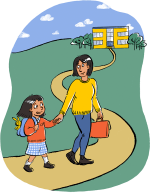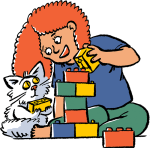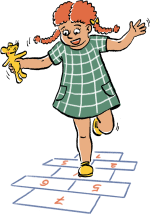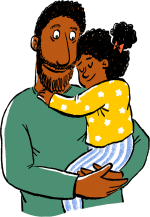Preparing for Reception
We know starting school can be a worrying time for both you and your child, we have linked up with StartingReception.co.uk to share some tips on how to prepare for that first day.
Starting Reception
 Your child's journey to school starts at home
Your child's journey to school starts at home
We understand that all children develop at their own pace, and that we’re all learning from birth. When it’s time to start school, some children will need more help than others.
There are key skills* that schools expect children to be learning before their first day. Practising these will make your child’s journey to Reception as positive as possible.
If your child is already at nursery, in pre-school, or with a childminder, those professionals will work with you and your child to help get them ready.
There’s lots you can do at home to build your child’s confidence and independence, helping them feel emotionally and practically prepared to start school.
*We are calling this document the ‘Starting Reception’ definition. Some people/organisations refer to this as ‘school readiness’.
How can I help my child get ready?

- Your child will have lots of new activities and routines to get used to when they start school. There are some things they’ll need to do more independently than they might have before.
- Research shows that a child’s relationship with their parents is the most important factor in their development, and there’s a lot you can do at home.
- When your child is at home with you or another caregiver, you can practice as a family with fun activities (we’ve included links at the end of this resource).
- Some of these skills take time to master, so it’s good to introduce them gradually as part of your daily routine.
What if my child has additional needs?
- If your child needs additional support to settle into Reception, make sure you share as much information as possible with their new teacher. They can work with you to find strategies to support your child.
- Summer born children, or those speaking English as an additional language (EAL) may need more support.
- If you know or suspect your child has suspected or confirmed special educational needs (SEND), developmental differences or delays, some of these skills may not be achievable for them at this point.
- Early support makes a big difference – ask your child’s nursery, school, health visitor, local children’s centre or family hub for help.
Who can I speak to for help?
All children need help from their trusted adults to feel confident and excited about starting Reception.
- Your childminder/nursery/pre-school team or your health visitor, children’s centre or family hub can help if you need more information.
- We’ve also put together a list of organisations and resources further down to help you and your child get ready together.
The definition: skills to practice before starting Reception
New skills take time to learn. Practicing at home will help your child move into school more easily and with confidence.
Growing independence
 Taking care of themselves
Taking care of themselves
- Putting on/taking off their coat and shoes
- Using the toilet and washing their hands
- Getting dressed with little help, e.g. after using the toilet or doing PE
- Using a fork/spoon and drinking from an open cup
- Spending time away from you, learning they can be looked after by caring adults
Play, creativity and curiosity
- Engaging in imaginative play (e.g. role play)
- Drawing, painting, colouring and sticking
- Sharing story books with caregivers, looking at pictures and talking about the characters
- Exploring the world around them (e.g. looking closely at the natural world or playing safely with objects at home)
Building relationships and communicating
Being with others
- Practicing sharing and taking turns with toys
- Talking to them about how they are feeling and why
- Looking at story books together and speaking about what characters are feeling is a good way to do this
- Beginning to recognise what others are feeling, e.g. understanding if a friend is sad
- Encouraging them to set boundaries for themselves and others (e.g. knowing how to say ‘no’)
 Communication and language
Communication and language
- Singing along with songs and nursery rhymes
- Talking happily to others about activities, experiences and the world around them
- Showing they need help by speaking clearly (in basic English or sign language)
- Recognising the pattern of their name (so they can find it on their coat peg or jacket)
Listening and engaging
- Paying attention for short periods of time
- Listening to and following simple instructions
- Carrying on with a task even when it’s difficult and bouncing back if things go wrong
Physical development
 Getting moving for at least three hours a day
Getting moving for at least three hours a day
- Walking up and down steps (one foot at a time, using the wall for support)
- Climbing, running, jumping and playing
- Catching a large ball (most of the time)
- Doing simple puzzles and craft activities, strengthening their grip with cutting and sticking
Healthy routines
- Going to bed around the same time each night, waking up in time to get ready for school
- Limiting screen time to the recommended daily amounts (see advice)
- Eating a healthy diet and trying new foods
- Brushing their teeth with fluoride toothpaste twice a day (you’ll need to supervise this until they are at least 7)
 What should I do if I have concerns about my child’s development?
What should I do if I have concerns about my child’s development?
- If you're worried about your child's progress, talk to your childminder/nursery/pre-school team, health visitor, local children's centre or Family Hub.
- If your child has developmental delays or SEND (suspected or confirmed), speak to their childminder/nursery/pre-school team well before they start Reception.
- You can work with your child’s early years setting to help your child with self-care, managing emotions, social skills, and communication in a way that suits their stage of development.
- You might want to share details about their development, needs, what motivates them, what might trigger difficulties, how they learn best, and what strategies work well.
- Make sure you share important information with everyone supporting your child, including their new Reception teacher.
Resources for families with additional needs:
There are many organisations who can support you with information and strategies to prepare you, your child and their educational setting, ensuring a smooth transition and setting them up for future success.
These include:
Useful Links
Growing independence
- Check out Parentkind’s online advice hub and magazine for parents ‘Be School Ready’
- Enjoy Family Corner’s 5 tips to help your child get ready for Reception
- Guidance for parents and practitioners - PACEY
- Download the free EasyPeasy mobile app for tips and activities to support everyday parenting moments
Taking care of themselves
- How can you make separating easier? - Family Corner
- Getting dressed and ready for the day - backward chaining information sheet - NHS
- Getting ready for the Day - BBC
Toilet training
- The Institute of Health Visiting has advice and tips on toilet training
- Simple and supportive toilet training advice - ERIC
- Potty training and bedwetting - NHS
- Pants4School - Down Syndrome UK
Playing, creativity and curiosity
- 5 steps for brain building through serve and return - Center on the Developing Child at Harvard University
- How to follow a child’s interest in play - National Literacy Trust
- How to role play with your child - Pretend role play - BBC
- How to role play with your child - Playing pretend animals - BBC
- Fire up their imagination with drawing - BBC
- What is mark-making and why is it important for learning? - PACEY
- Sharing story books on World Book Day - BBC
- Nature activities for children - BBC
- Learning and having fun on the bus - BBC
- Play a game of 'What's that sound?' - BBC
Building relationships and communicating
- The Royal Foundation Centre for Early Childhood’s Shaping Us Framework outlines how these skills develop in early childhood
- Top tips for enjoying stories together and book recommendations for starting school - BookTrust
Being with others
- Learn how to support your child to make friends - Family Corner
- Understand your child's social development - Words for Life
- Practice sharing with toys - BBC
Communication and language
- You are your child’s first teacher – help them learn how to write their name - Words for Life
- Explore a range of approaches to language learning and development from NHS Start for Life
- Build your child’s imagination and language by making up stories together - BBC
Listening and engaging
Healthy routines
Understand what 'healthy' levels of screen time are, by age
Get insights on internet safety, how screen use impacts young children and recommended screen time
And for those with younger children, the NCT covers advice for babies and toddlers too:
Help children build a strong relationship with food and make the right choices from the start
- Nutrition guidance - Department for Education
- Healthier families - NHS
- Five tips for helping your kids to eat healthily all year round - BBC
- Eating Well - First Steps Nutrition Trust
- Factsheet for healthy children's diets - Association of UK Dieticians
Brushing teeth
Sleep guidance
All content on this page is credited to Home - Starting Reception



